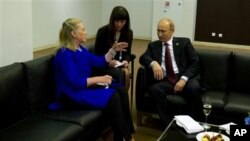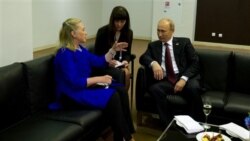In recent years, the U.S. and Russia have deepened their cooperation in a number areas including, adopting a new START treaty, increasing trade and investment, and supporting Russia’s bid to join the World Trade Organization. On her recent trip to Russia, U.S. Secretary of State Hillary Clinton announced additional agreements between the two countries.
The United States and Russia have committed to greater scientific cooperation in Antarctica. Scientists from both countries will together explore Antarctica’s terrain, study the effects of climate change, and work to better protect the environment. U.S. and Russian officials will also work to enforce the Antarctic Treaty, inspecting foreign facilities and looking for violations of the treaty’s environmental commitments.
The U.S. and Russia have signed a Joint Statement on Inter-Regional Cooperation to encourage greater collaboration at all levels of government. Regional and local officials will host trade delegations and introduce businesses to new markets.
In another joint statement, the United States and Russia are committing to work together in the region of the Bering Strait called Beringia. The idea is to link U.S. national parks in Alaska with the soon-to-be designated Beringia National Park. The goal is to finalize this arrangement in the coming months so park managers and researchers from both countries will be able to increase their efforts to conserve this unique ecosystem as well as the cultural traditions and languages of the indigenous people on both sides of the strait.
Finally, thanks to a historic visa agreement, travel between the United States and Russia will be much easier and will strengthen people-to-people ties and business contacts. “Business communities in our countries,” said Secretary Clinton, “repeatedly ask us for visa liberalization to make it easier for them to work together, and we are happy to be able to deliver.”
The United States looks forward to continuing to work with Russia on areas of common concern that will deliver benefits to the people of both countries.
The United States and Russia have committed to greater scientific cooperation in Antarctica. Scientists from both countries will together explore Antarctica’s terrain, study the effects of climate change, and work to better protect the environment. U.S. and Russian officials will also work to enforce the Antarctic Treaty, inspecting foreign facilities and looking for violations of the treaty’s environmental commitments.
The U.S. and Russia have signed a Joint Statement on Inter-Regional Cooperation to encourage greater collaboration at all levels of government. Regional and local officials will host trade delegations and introduce businesses to new markets.
In another joint statement, the United States and Russia are committing to work together in the region of the Bering Strait called Beringia. The idea is to link U.S. national parks in Alaska with the soon-to-be designated Beringia National Park. The goal is to finalize this arrangement in the coming months so park managers and researchers from both countries will be able to increase their efforts to conserve this unique ecosystem as well as the cultural traditions and languages of the indigenous people on both sides of the strait.
Finally, thanks to a historic visa agreement, travel between the United States and Russia will be much easier and will strengthen people-to-people ties and business contacts. “Business communities in our countries,” said Secretary Clinton, “repeatedly ask us for visa liberalization to make it easier for them to work together, and we are happy to be able to deliver.”
The United States looks forward to continuing to work with Russia on areas of common concern that will deliver benefits to the people of both countries.






